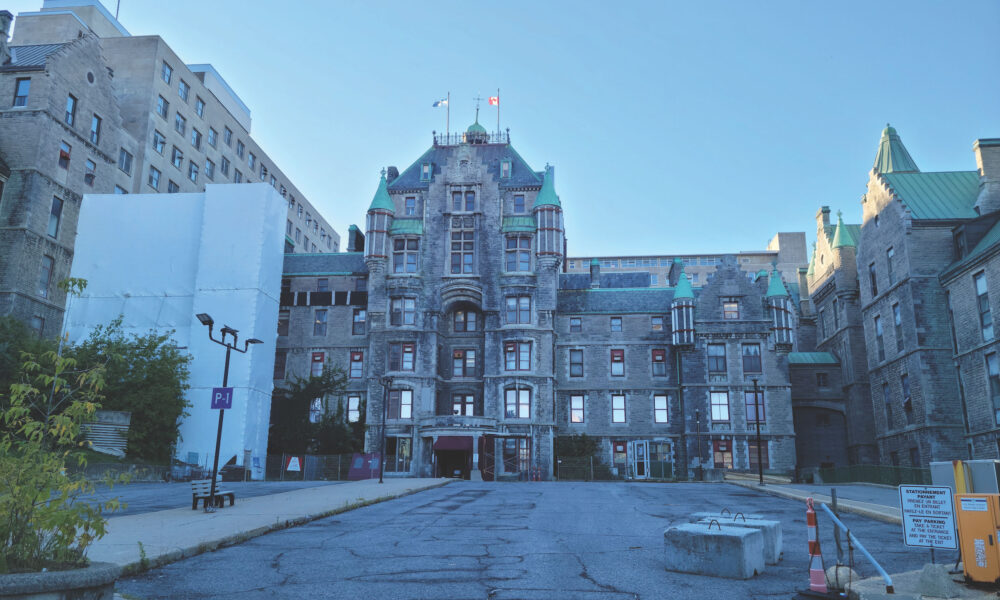CW: Mentions of colonial violence, abuse
On Sept. 20, the Kanien’kehà:ka Kahnistensera (Mohawk Mothers) attended a case management hearing at the Quebec Superior Court as part of their ongoing lawsuit against McGill over the New Vic project.
Exceptionally, federal and provincial representatives were brought onto the case as third parties. Independent Special Interlocutor Kimberly Murray was established as a “friend of the court”—someone brought on to offer outside expertise or information—during the proceedings. A member of the Kanesatake Mohawk Nation herself, Murray is a federal representative for cases involving Indigenous unmarked graves and burial sites.
Daniel Benghozi, representing the Attorney General of Quebec (AGQ), was also added to the case as a third (impleaded) party because of its importance and potential to alter standing pieces of Quebec legislation, such as the Cultural Heritage Act.
Philippe Blouin, an anthropologist and associate of the Mohawk Mothers, thinks that the AGQ ended up playing an outsized role in the case.
“The Quebec attorneys […] decided to join [the hearings] as a third party, but they ended up leading the whole defence […] and litigating very aggressively,” Blouin said in an interview with The McGill Tribune.
According to Blouin, Murray’s inclusion as a third party in court seemed to worry McGill and the AGQ.
“[The opposition] fears that [Murray] will give evidence that there are bodies [on the land in question],” Blouin said. “It is quite an issue that Quebec is pushing back against the person in Canada who’s supposed to facilitate the investigation of unmarked graves.”
On Sept. 20, the AGQ filed a cross-examination in which they asked Mohawk Mother Kahentinetha 57 questions. The Mothers officially filed their answers on Sept. 21, though they found the questions to be problematic. Kahentinetha elaborated in an interview with the Tribune, saying she believes the questions served no purpose but to diminish her status as an Indigenous person in front of the court.
“Questions like, ‘how many nations are there in the Iroquois confederacy?’ First of all, there is no Iroquois confederacy,” Kahentinetha said.
Kwetiio, another Mother, echoed Kahentinetha’s sentiments and agreed that the Mothers found AGQ’s cross-examination questions to be irrelevant and uninformed.
“They gave her a set of questions […] that were almost comical in our eyes,” Kwetiio said in an interview with the Tribune. “[These questions] are [striking] even to her being because they are all uneducated questions, so when she does answer them, all of them have nothing to do with the case.”
McGill media relations officer Frédérique Mazerolle stated that the university is devoted to resolving the dispute alongside Indigenous groups and governing bodies.
“We are committed to collaborating with governments, the Société Québécoise des infrastructures (SQI), […] and Indigenous community leadership to undertake the work necessary to investigate this concern,” Mazerolle wrote in a statement to the Tribune.
The Mohawk Mothers are not satisfied with McGill’s promises of collaboration. McGill announced in court its intent to strike down Blouin’s affidavit, a collection of 100 exhibits of analysis and explanations of archival evidence by Blouin himself, which the Mothers filed on Aug. 25. According to Blouin, the Mohawk Mothers are also frustrated with the SQI’s exclusion of the Mothers from the archaeological process.
“We have been [making requests] to meet with Arkéos for over a month [….] to make sure that they are not destroying forensic evidence of the bodies that are there [….] The SQI cancelled that meeting, and […] they forbid [Arkéos] to meet with us,” Blouin said. (Arkéos is the firm hired by McGill to survey the Royal Vic site.)
The SQI is postponing archeological work until they organize an information session with Arkéos. The Mohawk Mothers are apprehensive about attending such a meeting, however, as they fear the SQI may consider their presence as consent to begin work.
The next hearing will take place on Oct. 26, and the Mohawk Mothers have invited McGill students to attend and show their support.









Pingback: Construction begins on New Vic site without consent from Mohawk Mothers - The McGill Tribune